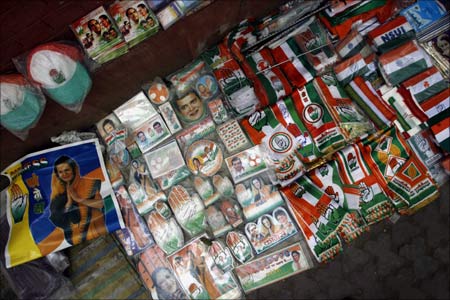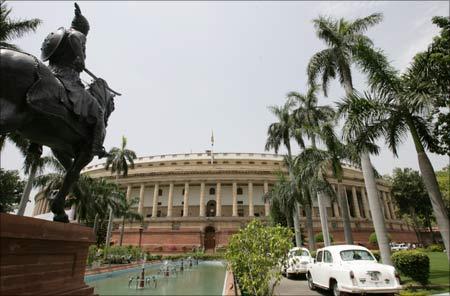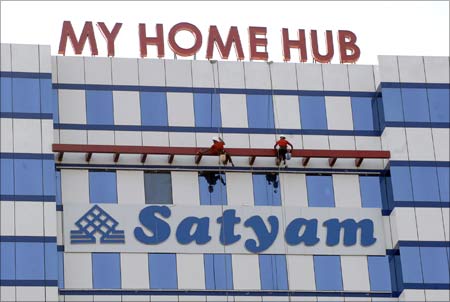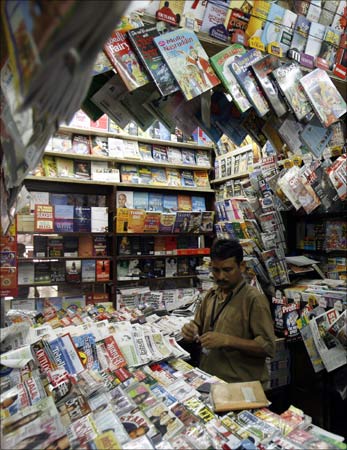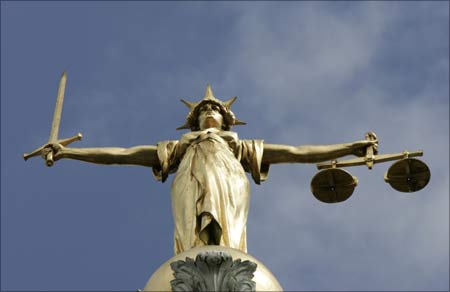 | « Back to article | Print this article |
The who's who of corruption in India
Politicians voted most corrupt
Political parties are perceived to be the most corrupt institution by Indians, according to 2009 Global Corruption Barometer. The Barometer, a global public opinion survey, released by Transparency International, found that 58 per cent Indian respondents identified politicians to be single most corrupt individuals.
45 per cent of the people sampled feel that the government is ineffective in addressing corruption in the country.
The survey in India, conducted at the national level between October and November last year also indicated that the perception of government effectiveness in relation to addressing corruption had improved from 2007.
Forty two per cent of people analysed, said that government's actions in the fight against corruption was effective.
The who's who of corruption in India
Civil servants follow politicians
Civil servants /public officials were rated by 13 per cent of respondents as the second most corrupt institution in the country.
Other institutions that were polled included the parliament/legislature , the private sector, media and the judiciary.
The Barometer, now in its sixth edition, surveyed 73,132 people in 69 countries including 12 countries from Asia Pacific. In India, the survey was conducted in five metros -- Delhi, Mumbai, Kolkata, Chennai and Bangalore.
The who's who of corruption in India
Parliament, law-making bodies
About 10 per cent of the respondents feel that Parliament and law-making bodies are corrupt
The 2009 Barometer shows the poorest families continue to be punished by petty bribe demand. Across the board, low-income respondents were more likely to be met with bribe demands than high-income respondents.
While only 9 per cent of the respondents reported having paid bribes, Transparency International India's India Corruption study 2008 that surveyed corruption in the below poverty line sector shows that the poor are forced to cough up about Rs 900 crore (Rs 9 billion) as bribe to avail basic and need based services.
"Petty corruption denies people their entitlement to basic and need based services, as a result of which the poor find themselves at the losing end of corruption" said TII Chair Admiral (Retd) R H Tahiliani.
The who's who of corruption in India
Corruption in the private sector
Almost 9 percent of those surveyed consider business and private sector to be corrupt
The private sector uses bribes to influence public policy, laws and regulations, believe over half of those polled for the survey. The business related findings of the Barometer send a powerful signal to the private sector to prove that they are clean and to communicate this clearly to the public.
45 per cent of those polled felt that the existing channels for making corruption-related complaints were ineffective.
Very few lodge formal complaints, demonstrating serious defects in the perceived legitimacy and effectiveness of channels for reporting and addressing bribery.
"The institutional anti-corruption framework generally suffers from the lack of coordination, overlaps and conflicting mandates between the myriad of institutions fighting corruption in the country" said Anupama Jha, executive director of Transparency International India.
The who's who of corruption in India
Corruption in media
As many as 8 per cent of the respondents in India consider that corruption in the media affects the lives of people.
The media, while not being perceived as clean, scored best with just over 40 per cent of respondents labeling the sector as corrupt, gobally.
The who's who of corruption in India
Judiciary not spared either
Almost 3 per cent respondents in India consider the judiciary to be corrupt.
Anti corruption tools such as RTI, Social audit, Citizens' Charters and use of the technology are wonderful tools to check corruption, but majority of the population in the country are not aware of these instruments.
Transparency International has also devised tools such as Integrity Pact and Development Pact to check corruption in areas of procurement and political institutions, respectively. We are advocating for the adoption of these tools.
